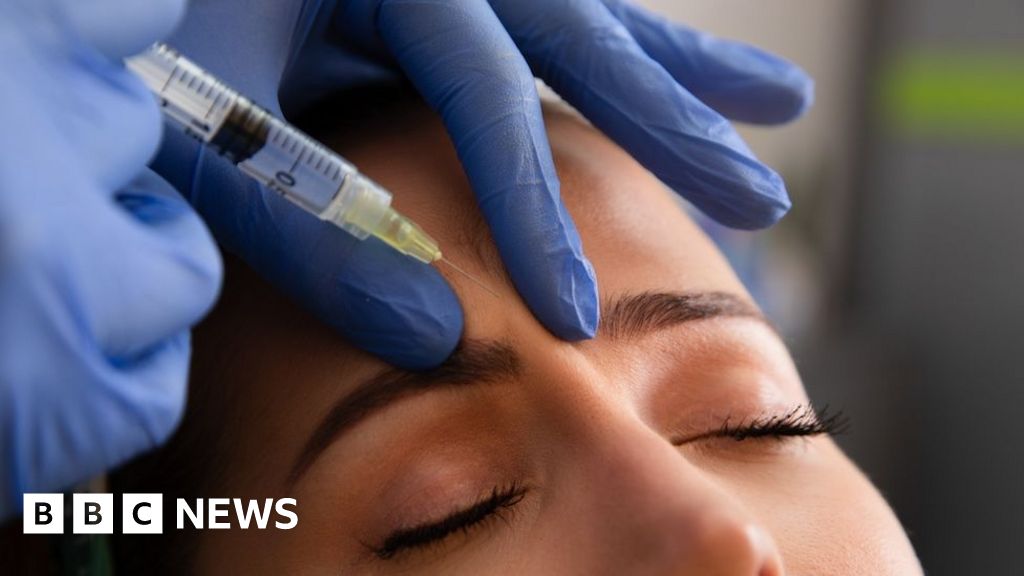Cosmetic procedures such as fillers, Botox and Brazilian butt lifts are taking place in public toilets, hotel rooms and other "shocking locations" in Britain, officials have warned. People's lives "are being put at risk every single day" by the lack of regulation in the industry, the Chartered Trading Standards Institute (CTSI) says, as it called for urgent action to set up a licensing scheme. It has also uncovered unsafe fillers and fat-dissolving injections being sold online. The Department for Health and Social Care says the government is looking into new regulations to protect people. Kerry Nicol, external affairs manager at the CTSI, said she was "genuinely shocked by the scale of potential harm facing the public due to the alarming lack of regulation in the aesthetic industry". She added that "action is urgently needed" to crack down on "bad players operating in this sector" and a cross-government approach was required. The priority is giving the public a clear indication of who is qualified to carry out these procedures, Ms Nicol said. Trading standards officials said they were particularly worried about young people getting injections, because finding practitioners who checked for the minimum age of 18 was a "postcode lottery". Their advice is always to: Trading standards officials are also concerned about fillers being sold online for as little as £20 and fat loss injections, such as Lemon Bottle, which have no "regulatory oversight" in the UK. Earlier this month, the UK Health Security Agency (UKHSA)reported a number of peoplehad suffered adverse side-effects after being injected with suspected counterfeit botox. Officials are also worried about consumers undergoing fat injections, such as liquid BBLs (Brazilian butt lifts), which involve injecting filler into the buttocks to lift them and make them look bigger or more rounded. The procedure is very risky and can cause serious side-effects such as blood clots and sepsis. In September last year,33-year-old Alice Webbis believed to have died after suffering complications from having a liquid BBL in Gloucestershire. As it stands, you do not need a licence to perform cosmetic procedures in England, but this could change ifan amendment brought forward in 2022is passed by parliament. The government has previously suggested making changes to the Health and Care Act, which would bring in a scheme to protect consumers from unlicensed practitioners. A spokesperson for the Department of Health and Social Care said: "People's lives are being put at risk by inadequately trained operators in the cosmetic sector, which is why the government is looking into new regulations to protect people. "The safety of patients is paramount and we urge anyone considering cosmetic procedures to consider the possible health impacts and find a reputable, insured and qualified practitioner." To improve safety for consumers, the Scottish government announced plans in May to regulate aesthetic treatments. There are currently no plans to do the same in Northern Ireland and Wales. Ashton Collins, director at Save Face, which provides a register of accredited practitioners, said her organisation had been campaigning "to ban liquid BBLs from the high street". She added: "We are focused on reinforcing existing legislation that has long failed to protect patients from unscrupulous practitioners who continue to flaunt the law with impunity. "For too long, regulations intended to safeguard patients have been inadequately policed and enforced."
Warning over filler injections in public toilets
TruthLens AI Suggested Headline:
"Concerns Raised Over Safety of Cosmetic Procedures Conducted in Unregulated Environments"
TruthLens AI Summary
A growing concern has emerged regarding the practice of cosmetic procedures, including fillers, Botox, and Brazilian butt lifts, being conducted in unsafe environments such as public toilets and hotel rooms across Britain. The Chartered Trading Standards Institute (CTSI) has raised alarms about the lack of regulation in the aesthetic industry, emphasizing that individuals' lives are being jeopardized daily. Kerry Nicol, the CTSI's external affairs manager, expressed her shock at the extent of potential harm faced by the public due to unregulated practices. She called for immediate action to establish a licensing scheme that would help identify qualified practitioners and eliminate 'bad players' from the sector. Trading standards officials particularly worry about the vulnerability of young people who seek these procedures, as the enforcement of age checks is inconsistent, creating a 'postcode lottery' situation. The CTSI has also highlighted the alarming availability of unsafe fillers and fat-dissolving injections sold online, with prices as low as £20, and has urged consumers to be cautious of such offers.
The risks associated with these cosmetic procedures are significant, as evidenced by recent reports from the UK Health Security Agency (UKHSA), which noted adverse side effects from counterfeit Botox injections. The dangers of fat injections, like liquid Brazilian butt lifts, are particularly concerning, with potential complications including blood clots and sepsis. Tragically, there have been fatalities linked to these procedures, including the case of 33-year-old Alice Webbis, who died following a liquid BBL in Gloucestershire. Currently, no licensing is required for practitioners in England, but the government is considering amendments to the Health and Care Act to enhance consumer protection. The Department of Health and Social Care has acknowledged the risks posed by inadequately trained operators and is exploring regulatory measures. Meanwhile, the Scottish government has initiated plans to regulate aesthetic treatments, although no such measures are currently in place for Northern Ireland and Wales. Advocacy groups like Save Face are pushing for stricter regulations to prevent unscrupulous practitioners from exploiting the lack of oversight in this industry.
TruthLens AI Analysis
You need to be a member to generate the AI analysis for this article.
Log In to Generate AnalysisNot a member yet? Register for free.
